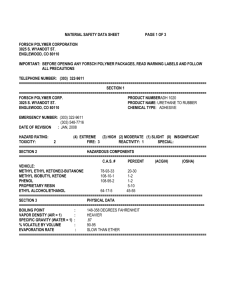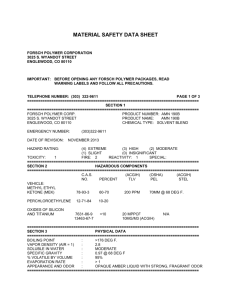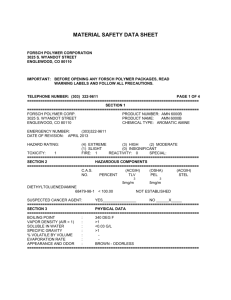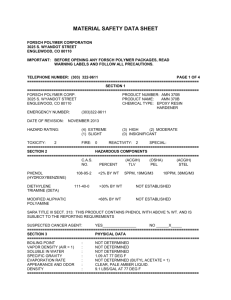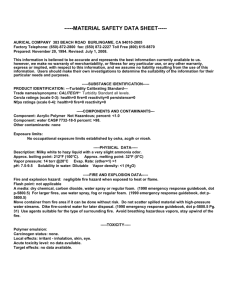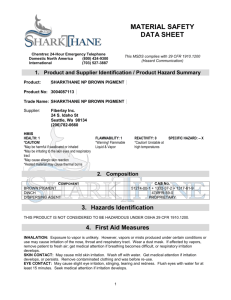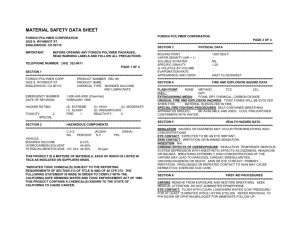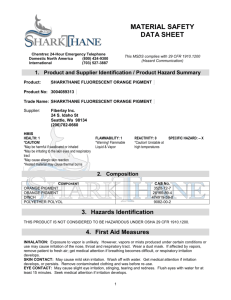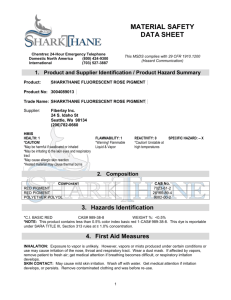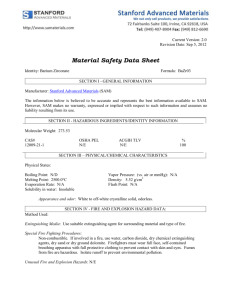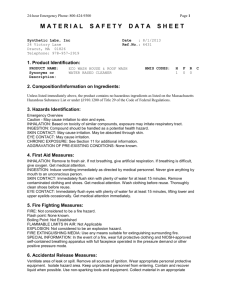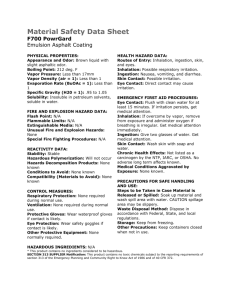POL8090B - Forsch Polymer Corporation
advertisement
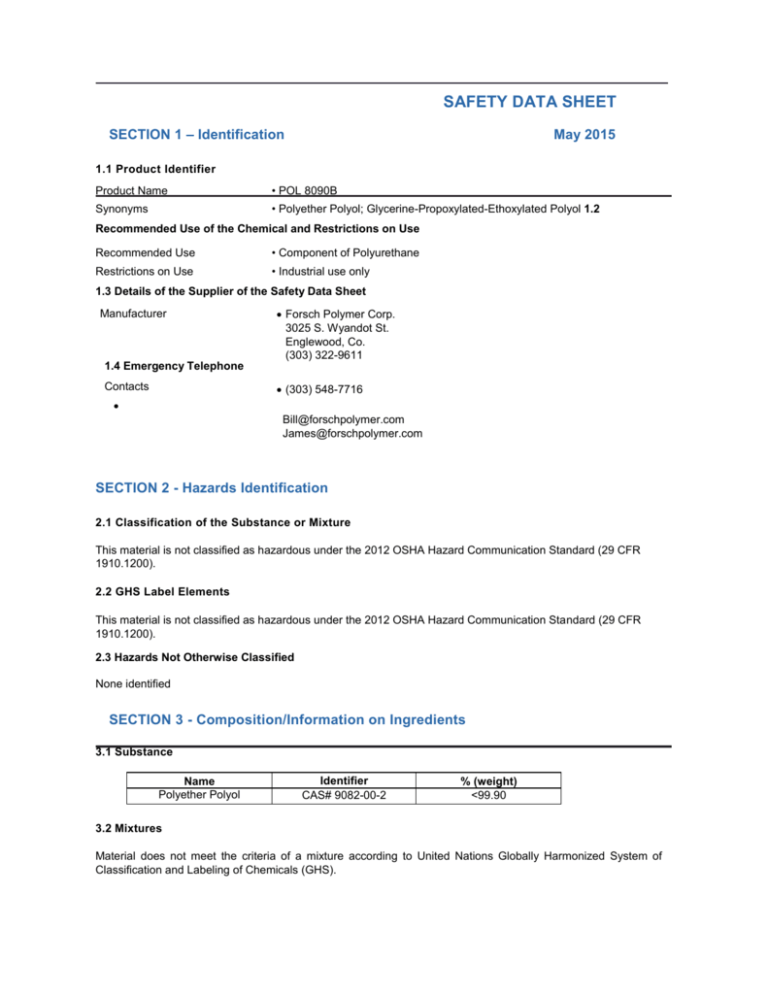
SAFETY DATA SHEET SECTION 1 – Identification May 2015 1.1 Product Identifier Product Name • POL 8090B Synonyms • Polyether Polyol; Glycerine-Propoxylated-Ethoxylated Polyol 1.2 Recommended Use of the Chemical and Restrictions on Use Recommended Use • Component of Polyurethane Restrictions on Use • Industrial use only 1.3 Details of the Supplier of the Safety Data Sheet Manufacturer Forsch Polymer Corp. 3025 S. Wyandot St. Englewood, Co. (303) 322-9611 1.4 Emergency Telephone (303) 548-7716 Contacts Bill@forschpolymer.com James@forschpolymer.com SECTION 2 - Hazards Identification 2.1 Classification of the Substance or Mixture This material is not classified as hazardous under the 2012 OSHA Hazard Communication Standard (29 CFR 1910.1200). 2.2 GHS Label Elements This material is not classified as hazardous under the 2012 OSHA Hazard Communication Standard (29 CFR 1910.1200). 2.3 Hazards Not Otherwise Classified None identified SECTION 3 - Composition/Information on Ingredients 3.1 Substance Name Polyether Polyol Identifier CAS# 9082-00-2 % (weight) <99.90 3.2 Mixtures Material does not meet the criteria of a mixture according to United Nations Globally Harmonized System of Classification and Labeling of Chemicals (GHS). Safety Data Sheet SECTION 4 - First Aid Measures 4.1 Description of First Aid Measures By route of inhalation • Remove victim to fresh air. By route of dermal contact • Wash thoroughly with soap and water. By route of eye contact • Flush with plenty of water. By route of ingestion • If victim is conscious, give 1 to 2 glasses of water. Do not induce vomiting unless directed to do so by medical personnel. 4.2 Most Important Symptoms and Effects, Acute and Chronic Refer to Section 11 Toxicological Information. 4.3 Indication of Immediate Medical Attention and Special Treatment If Needed Treat symptomatically and supportively. SECTION 5 - Firefighting Measures 5.1 Extinguishing Media Suitable Extinguishing Media • Dry chemical, foam, carbon dioxide, water fog or fine spray. Unsuitable Extinguishing Media • Do not use direct water spray. May spread fire. 5.2 Special Hazards Arising From the Substance or Mixture May produce oxides of carbon on combustion. Smoke may be toxic and/or irritating. 5.3 Special Protective Actions for Firefighters Responding personnel must wear positive-pressure, self-contained breathing apparatus (SCBA) and protective firefighting clothing. Spray cool water on fire exposed containers to reduce risk of rupture. SECTION 6 - Accidental Release Measures 6.1. Personal Precautions, Protective Equipment, and Emergency Procedures Isolate the area. Keep unauthorized people away. Do not touch or walk through the spilled material. Spilled material may be slippery. Ensure adequate ventilation in enclosed area. Eliminate all ignition sources. Use protective equipment appropriate for the size of the spill. 6.1. Environmental Precautions Prevent from entering into soil, ditches, sewers, waterways and/or groundwater. 6.3 Methods and Materials for Containment and Clean Up Safety Data Sheet Methods Stop leak, dam spill, and transfer liquid into a suitable container. Collect residue with absorbent and transfer into a suitable container for proper disposal. Materials Inert absorbent (sand, earth or similar). 6.4 Reference to Other Sections Refer to Section 8 for exposure control and personal protective equipment information. Refer to Section 12 for ecological information. SECTION 7: Handling and Storage 7.1 Precautions for Safe Handling Keep containers tightly closed when not in use. Do not eat, drink, or smoke in working area. Avoid contact with eyes and minimize contact with skin Use good safety and industrial hygiene practices. Wash thoroughly after handling. 7.2 Conditions for Safe Storage, Including any Incompatibilities Storage Incompatibilities • Store materials in a cool, dry place. Do not transport with oxidizers. •Oxidizing materials, strong alkalis and acids, Isocyanates. SECTION 8: Exposure Controls/ Personal Protection 8.1 Control Parameters Exposure Limits/Guidelines None established. 8.2 Exposure Controls Engineering Controls Eye/Face Protection Respiratory Protection Skin Protection 02/17/2015 Adequate ventilation systems as needed to control concentrations of airborne contaminants below applicable exposure limits. Safety glasses with side shields. Chemical goggles if there is a significant risk of splashing. None required under normal use. If product is heated or sprayed, appropriate respiratory protection may be needed. • Wear suitable working clothes and shoes. Page 3 of 8 Safety Data Sheet Depending on the potential for exposure, chemical resistant gloves may not be needed (e.g.incidental use). As with any chemical, skin contact should be minimized with good work practices and PPE where needed. Wear chemical resistant gloves appropriate for the intended use. Consult glove manufacturers for assistance in choosing appropriate gloves. Ingestion Do not eat, drink or smoke in work area. Wash hands before eating or smoking. Additional Protection Measures None SECTION 9: Physical and Chemical Properties 9.1 Information on Physical and Chemical Properties Material Description Physical Form Color • Liquid • Clear Odor Odor Threshold General Properties Boiling Point Decomposition Temperature Density (at 25°C) Solvent Solubility Explosive Properties No data No data available No data Melting Point pH Volatility o data available Vapor Pressure Evaporation Rate Volatiles (Vol.) No data available No data available No data available Vapor Density VOC (Vol.) No data available No data available Flammability Flash Point UEL Auto-ignition Temperature >200°F (PMCC) No data available No data available LEL Flammability (solid, gas) No data available No data available • Low odor I • No data available No data available 7.0 (ave) Water Solubility N Viscosity (at 25°C) N Specific Gravity/Relative Density Low No data 1.01 (H20=1) Environmental Octanol/Water Partition Coefficient • No data available I 9.2. Other Information No additional information available SECTION 10: Stability and Reactivity 10.1 Reactivity No dangerous reaction known under conditions of normal use. 02/17/2015 Page 4 of 8 Safety Data Sheet 10.2 Chemical Stability Stable under normal temperatures and pressures. 10.3 Possibility of Hazardous Reactions No hazardous reactions if handled and stored as recommended. 10.4 Conditions to Avoid Elevated temperatures 10.5 Incompatible Materials Oxidizing materials, strong alkalis and acids, isocyanates. 10.6 Hazardous Decomposition Products No data available. SECTION 11: Toxicological Information 11.1 Information on Toxicological Effects Acute Toxicity Chemical Polyether Polyol CAS # 9082-00-2 LD50oralrat >2000 mg/kg LD50dermal rabbit >2000 mg/kg LC5o inhalation rat Not available Skin Corrosion/Irritation Based on available information, skin corrosion/irritation is not expected under normal conditions of use. Serious Eye Damage/Irritation Based on available information, eye damage/irritation criteria are not met. Respiratory or Skin Sensitization Based on available information, sensitization criteria are not met. Germ Cell Mutagenicity Available studies have not indicated this material to be a mutagen. Carcinogenicity This product does not contain any component that is considered a human carcinogen by IARC, ACGIH, OSHA or NTP. Reproductive Toxicity No data available Specific Target Organ Toxicity (single exposure) No data available Specific Target Organ Toxicity (repeated exposure) No data available Aspiration Hazard No data available 11.2 Potential Health Effects 02/17/2015 Page 5 of 8 Safety Data Sheet Inhalation Acute Chronic • Not expected to be a hazard due to low vapor pressure. • None known. Acute Chronic • None known. • None known. Acute Chronic • May cause mild irritation. • None known. Skin E ye Ingestion Acute Chronic • Small amounts swallowed may cause gastrointestinal discomfort. • None known. SECTION 12: Ecological Information 12.1 Ecotoxicity This product is not expected to cause significant effects in the aquatic environment. 12.2 Persistence and Degradability No data available 12.3 Bioaccumulative Potential No data available 12.4 Mobility in Soil No data available 12.5 Other Adverse Effects No data available SECTION 13: Disposal Considerations 13.1 Waste Disposal Method Product Waste Do not dump into any sewers, on the ground, or into any body of water. All disposal methods must be in compliance with Federal, State/Provincial, and local regulations. Packaging Waste Dispose of content and/or container in accordance with local, regional, national, and/or international regulations. SECTION 14: Transport Information U.S. DOT Not regulated as hazardous for shipment. 02/17/2015 6of8 Safety Data Sheet SECTION 15: Regulatory Information 15.1 Regulatory Status CERCLA Hazardous Substances (40 CFR 302): None reportable. SARA 311/312: None reportable. SARA 313: None reportable. 15.2 US State Regulations STATE RIGHT-TO-KNOW: To the best of our knowledge, this product contains no chemical known to the State of California to cause cancer, birth defects, or other reproductive harm. (California Health and Safety Code Section 25249.6). 15.3 Canadian Regulations DSL: All components of this product are listed on, or exempt from the DSL. WHMIS Information: Not a "Controlled Product" under WHMIS. 15.4 International Inventories* United States: All components of this product are listed on the TSCA inventory. Australia: All components of this product are listed on the AICS. China: All components of this product are listed on the IECSC. Japan: All components of this product listed on the ENCS. Korea: All components of this product are listed on the ECL. Philippines (PICCS): All components of this product are listed on the PICCS. REACH: Listed as a registered substance. "=Although a chemical may be listed on a country's inventory, it may not indicate a hazard or regulatory control for use. SECTION 16: Other Information 16.1 HMIS AND NFPA RATINGS HMIS Classification Health: 0 Flammability: 1 Reactivity: 0 NFPA Ratings Health: 0 Flammability: 1 Instability: 0 Special: None 16.2 EU CLP Relevant Phrase Not classified 16.3 Preparation By I.H. Department 16.4 Preparation Date : May 2015 02/17/2015 Page 7 of 8 Safety Data Sheet 16.5 Last Revision Date May 2015 16.6 Disclaimer/Statement of Liability The data in this Safety Data Sheet is offered for your consideration, investigation and verification. The data is presented in good faith and was obtained from sources Forsch Polymer believes to be reliable. Forsch Polymer, however, makes no representation as to the completeness or accuracy. Forsch Polymer makes no warranty, express or implied, with respect to the data contained herein. Forsch Polymer cannot anticipate all conditions under which this data and the product may be used. The conditions of handling, storage, use, and disposal of th e product are beyond Forsch Polymer’s control. Thus, we expressly disclaim responsibility or liability for any loss, damage or expense arising out of reliance on the information contai ned herein. You are advised to make your own determination as to safety, suitability and appropriate manner of handling, storage, use and disposal. 02/17/2015 Page 8 of 8
